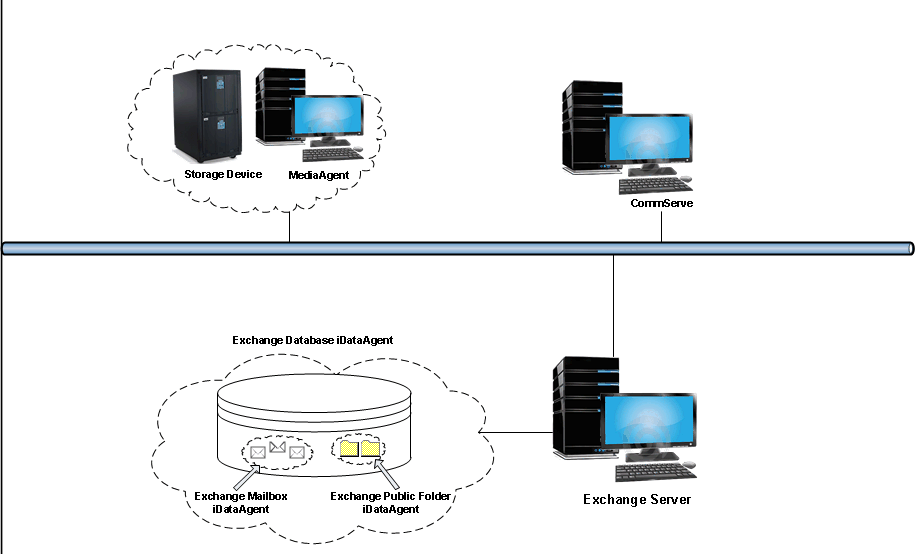 Database
Protection for Disaster Recovery
Database
Protection for Disaster Recovery
Table of Contents |
Where to go Next |
|
Database Protection for Disaster Recovery Granular Protection of Messages and Mailbox Items |
Install the Exchange iDataAgents Walks you through the process of installing the Exchange Agents. |
The Exchange Server iDataAgents provide a unified protection and recovery vehicle for all Exchange data in your enterprise. In addition to complete protection of entire Exchange databases for disaster recovery, more granular backup and recovery options are available for mailboxes and public folders. Added options for Outlook integration, deduplication, content indexing, and advanced reporting help ensure all your Exchange data is easily traceable and retrievable whenever the need arises.
The Exchange Server iDataAgents offer the following key features:
 Database
Protection for Disaster Recovery
Database
Protection for Disaster RecoveryThe Exchange Database iDataAgent backs up each Exchange database, which includes the following key components:
In the event of a serious system failure, such as the breakdown of hardware, software, or operating systems, the Exchange Database iDataAgent provides point-in-time recovery of a given database, ensuring that the state of the Exchange Database as it existed at any given time is ready for use whenever necessary.
The Exchange Mailbox iDataAgent backs up individual mailboxes for quick retrieval of individual mailbox data, such as messages and attachments, that may have been lost from a user's Outlook mailbox. Regular backups of mailboxes also provide the facility to quickly restore entire mailboxes without requiring restores of the Exchange database.
The Exchange Public Folder iDataAgent backs up public folders for quick retrieval of shared data between Exchange users, such as group documents, messages, attachments, and calendars. As with the Exchange Mailbox iDataAgent, regular backups of mailboxes also provide the facility to quickly restore any number of public folders without requiring restores of the Exchange database.
SnapProtect Backup enables you to create a point-in-time snapshot by temporarily quiescing the data, taking a snapshot, and then resuming live operations. SnapProtect backups work in conjunction with hardware snapshot engines.
Desktop Browse enables users to browse and restore data from a Web Browser, which provides the facility to access and restore data from anywhere.
Content Indexing and Search enables users to content index their data and later search the data from a user-friendly web interface. The users can also perform restore operations or other advanced actions on the searched data.
The Microsoft Exchange Server iDataAgent documentation uses the following terminology:
Database |
Includes all operational elements of the Exchange Server, such as Stores, Transaction Logs, Patch Files, and Exchange Organizational Data. |
Non-Exchange Server |
A computer other than the Exchange Server on which the Mailbox and Public Folder iDataAgents may be installed. Using a non-Exchange Server often results in less overhead on the Exchange Server during backup and restore operations. |
Affinity |
An association between two entities used in Automatic Discovery scenarios. For example, automatic discovery of mailboxes by database affinity implies the mailbox is included in the selected database. |
The Advanced pages of this documentation outline the features applicable for your version of Exchange in a tabular format for quick access to the documentation you need as shown below:
Exchange 2010 |
Exchange 2007 |
Exchange 2003 |
Sections not listed for a particular version of Exchange are not applicable or supported for that Exchange version.